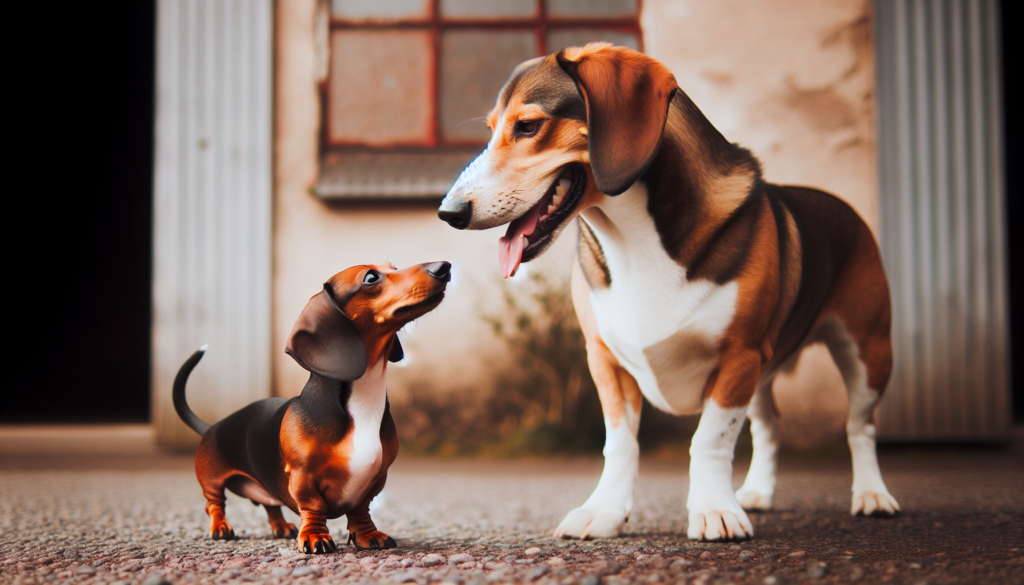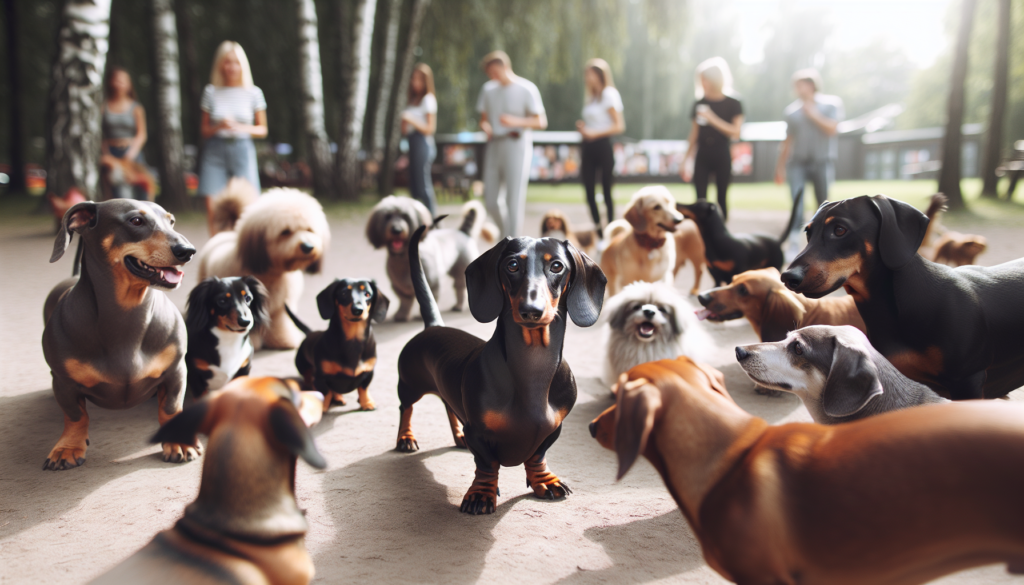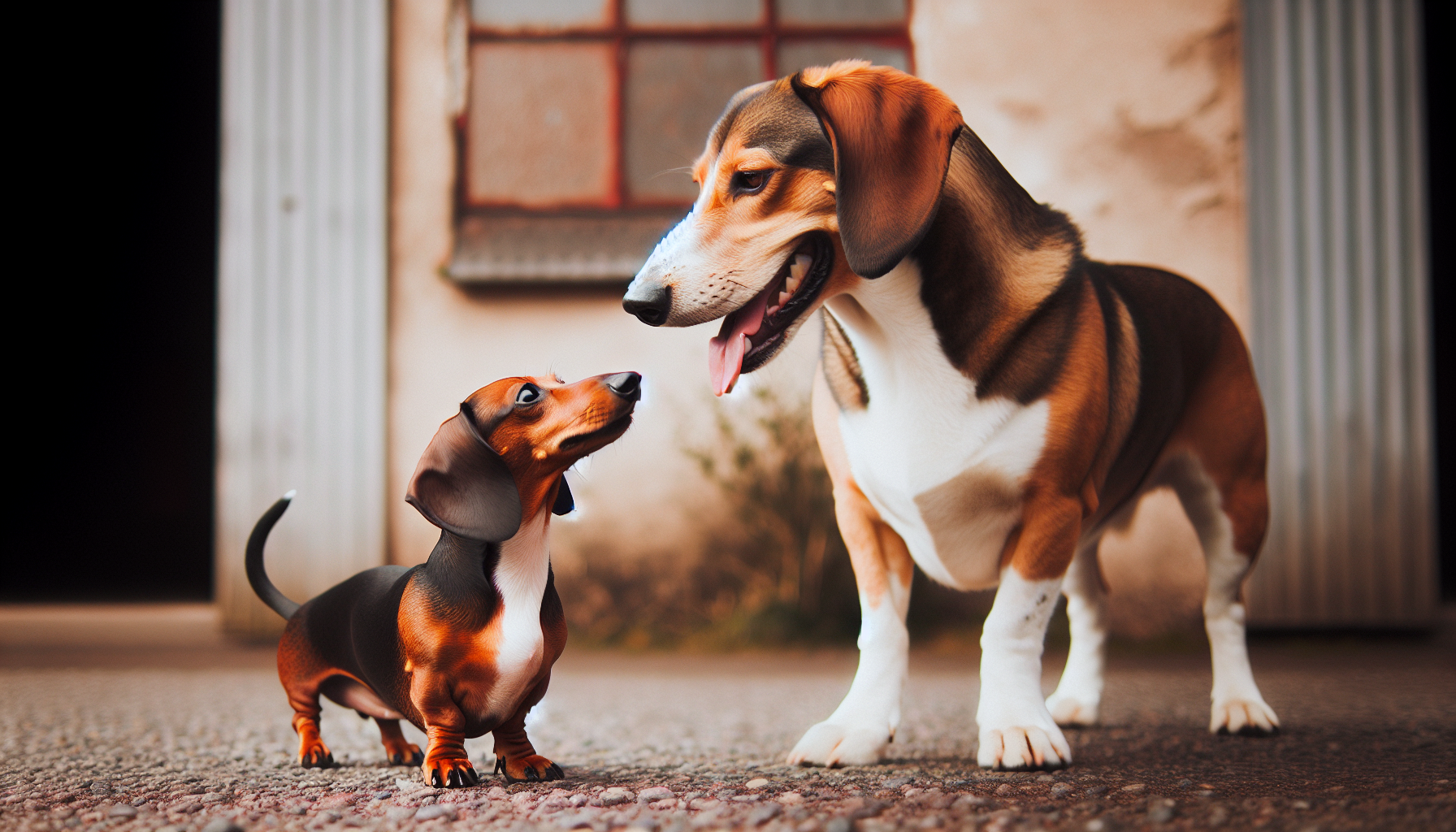Have you ever wondered if Dachshunds are friendly with other dogs? Well, it turns out that these adorable long-bodied pooches have a reputation for being a bit… shall we say, selective when it comes to their furry friends. In this article, we’ll explore whether or not Dachshunds are social butterflies or prefer to keep to themselves when it comes to canine companionship. Get ready to discover how these little wiener dogs navigate the world of doggy friendships!
Factors That Influence Dachshund’s Compatibility with Other Dogs
Dachshunds, with their unique body shape and strong personalities, have a reputation for being independent and sometimes even stubborn. While they can form strong bonds with their owners, their compatibility with other dogs can vary. Several factors play a role in determining how well a Dachshund gets along with other dogs. Understanding these factors can help you make informed decisions when introducing your Dachshund to new canine companions.
Temperament of Dachshunds
Dachshunds have a distinct temperament that sets them apart from other dog breeds. Their individual temperament can greatly influence their compatibility with other dogs.
Independent Nature
Dachshunds are known for their independent nature. They were originally bred for hunting, and their fearlessness and determination made them excellent at tracking and flushing out prey. This independence can sometimes manifest as stubbornness, making it important to ensure your Dachshund is properly trained and socialized to minimize any potential conflicts with other dogs.
Protectiveness
Dachshunds have a strong protective instinct, which can manifest in their interactions with other dogs. They may become territorial or exhibit guarding behaviors toward other dogs, especially if they perceive a threat to their home or family. Proper training and socialization can help minimize any aggression stemming from their protective nature.
Aggression
While Dachshunds are generally friendly and sociable, some individuals may display aggression towards other dogs. This aggression can be directed towards dogs of any size or breed and may result in conflicts or altercations. It is crucial to address any signs of aggression early on and seek the guidance of a professional dog trainer or behaviorist to address these issues appropriately.
Anxiety and Fearfulness
Dachshunds can be prone to anxiety and fearfulness, which can affect their interactions with other dogs. They may become nervous or display fearful behavior when encountering unfamiliar dogs, which can potentially lead to aggression or defensive reactions. Ensuring your Dachshund receives proper socialization and exposure to other dogs from a young age can help mitigate anxiety and fearfulness.
Friendliness and Sociability
Despite their potential challenges in getting along with other dogs, Dachshunds can also be incredibly friendly and sociable. With proper socialization and positive experiences, many Dachshunds form strong bonds and enjoy the company of other dogs. It’s essential to consider each Dachshund’s individual temperament and provide the necessary training and socialization to foster positive interactions with other dogs.

Socialization and Training of Dachshunds
Socialization and training play a vital role in shaping the behavior and compatibility of Dachshunds with other dogs. These factors can greatly influence how well your Dachshund interacts with other canines.
Early Socialization
Early socialization is crucial for Dachshunds to learn appropriate behavior and social skills with other dogs. Introducing your Dachshund to a variety of dogs and situations during their critical developmental period (between 3 to 14 weeks) can help them become more comfortable and adaptable when encountering unfamiliar dogs later in life.
Positive Reinforcement Training
Positive reinforcement training techniques are highly effective in teaching Dachshunds how to behave appropriately around other dogs. Rewarding your Dachshund for calm, friendly behavior towards other dogs can reinforce positive associations and encourage good socialization skills. Avoid using punishment-based training methods, as they can escalate anxiety or aggression issues.
Expectations from the Owner
As a Dachshund owner, it’s important to understand your role in shaping your dog’s behavior around other dogs. Consistency, patience, and clear communication are key. By setting clear expectations and providing guidance, you can establish a strong bond with your Dachshund and ensure they understand what is expected of them during social interactions with other dogs.
Obedience and Communication Skills
Teaching your Dachshund obedience commands and improving their communication skills can greatly enhance their compatibility with other dogs. Commands like “sit,” “stay,” and “leave it” can help you manage their behavior and prevent potentially tense situations with other dogs. Clear communication allows you to redirect their attention and reinforce appropriate behavior when interacting with other canines.
Size and Breed of Other Dogs
The size and breed of the other dogs your Dachshund interacts with can significantly impact their compatibility. Considering these factors can help ensure harmonious relationships between your Dachshund and other dogs.
Matching Sizes and Strengths
When introducing your Dachshund to other dogs, it’s important to consider their size and physical strength. Dachshunds have a unique body shape with elongated backs, which makes them prone to spinal issues. Interactions with larger, more energetic dogs can potentially lead to accidents or injuries, so it’s crucial to match their playmates’ sizes and energy levels to minimize any risks.
Compatibility with Different Breeds
Dachshunds can generally get along well with a wide range of dog breeds. However, individual temperaments and personalities vary between dogs of different breeds. It’s important to select playmates that align with your Dachshund’s temperament and energy level. Introducing your Dachshund to dogs with similar traits or those who have a proven compatibility record can increase the chances of a successful interaction.
Prey Drive and Hunting Instincts
Dachshunds were originally bred as hunting dogs, and some may retain a strong prey drive. This instinct can cause them to chase or display heightened interest in smaller animals, including other dogs. While not necessarily a compatibility issue, it’s crucial to be aware of their prey drive when introducing them to other dogs. Proper training can help manage their instincts and minimize any potential problems.
Dachshund’s Tendency to Chase or Bark
Dachshunds have a natural tendency to chase or bark, particularly when excited or stimulated. Some dogs may find this behavior annoying or threatening, potentially leading to conflicts. Training your Dachshund to control their chasing and barking tendencies can facilitate smoother interactions with other dogs.

Gender and Sterilization Status
The gender and sterilization status of dogs can influence their compatibility and interactions.
Male-Female Dynamics
The dynamics between male and female dogs can greatly impact their compatibility. While some male-female pairs get along well, others may exhibit dominant or territorial behaviors. It’s crucial to monitor interactions closely, especially when introducing intact dogs, to prevent any potential conflicts or unwanted mating attempts.
Intact Dogs versus Neutered/Spayed Dogs
Neutering or spaying your Dachshund can impact their compatibility with other dogs. Intact dogs, especially males, may display more dominant or territorial behaviors, increasing the likelihood of conflicts. Spaying or neutering can help mitigate these behaviors and promote better socialization with other dogs.
Territorial Behavior and Dominance
Dachshunds can exhibit territorial behavior, especially when confronted by unfamiliar dogs. This behavior can be more pronounced in intact or dominant individuals. Proper training, socialization, and managing the environment can help minimize territorial behavior and dominance issues.
Age and Energy Level of Dogs
The age and energy level of your Dachshund, as well as the dogs they interact with, are important considerations when determining compatibility.
Puppy and Adolescent Dachshunds
Puppies and adolescent Dachshunds are generally more playful and energetic than adult dogs. They may have different socialization needs and energy levels compared to older dogs, which can impact their compatibility with other dogs. It’s important to match your Dachshund’s age and energy level with suitable playmates to ensure they have positive and appropriate social interactions.
Older Dachshunds and Senior Dogs
As Dachshunds age, their energy levels may decrease, and they may become less tolerant of rambunctious play. Pairing older Dachshunds with similarly mature dogs or senior companions can provide them with more compatible playmates and reduce the risk of injury or stress.
Matching Energy Levels
Matching the energy levels of your Dachshund and other dogs is crucial for compatibility. Pairing high-energy Dachshunds with energetic dogs can ensure they have compatible play styles and reduce the risk of frustration or conflict. Similarly, pairing lower-energy Dachshunds with calm, easygoing dogs can help foster harmonious relationships.
Exercise and Playtime Requirements
Dachshunds have exercise and playtime requirements that should be considered when introducing them to other dogs. Providing regular exercise and mental stimulation can help reduce any pent-up energy and potential behavioral issues. When introducing your Dachshund to new playmates, ensure that all dogs receive sufficient exercise and playtime to prevent boredom or restlessness.
Previous Experiences and History
A Dachshund’s previous experiences and history can influence their compatibility and behavior towards other dogs.
Rescue Dachshunds with Trauma
Rescue Dachshunds may have experienced trauma or negative interactions with other dogs in their past. These experiences can shape their behavior and compatibility with other canines. Patience, understanding, and professional guidance can help rehabilitate and socialize rescue Dachshunds to increase their compatibility with other dogs.
Negative Interactions with Other Dogs
Previous negative interactions with other dogs can affect a Dachshund’s future compatibility. If a Dachshund has experienced aggression, fear, or mistreatment from other dogs, they may exhibit defensive or aggressive behavior in future encounters. Identifying and addressing any underlying issues through training and professional support is essential for improving compatibility.
Positive Experiences and Social Bonds
On the other hand, positive experiences and social bonds with other dogs can greatly enhance a Dachshund’s compatibility and sociability. Dachshunds who have had pleasant, rewarding interactions with other dogs are more likely to exhibit friendly and well-adjusted behavior towards new playmates. Building positive associations and experiences through socialization and supervised playdates can help foster strong social bonds.
How to Introduce Dachshunds to Other Dogs
Introducing Dachshunds to other dogs should be done gradually and in a controlled environment to ensure positive and successful interactions.
Gradual Introduction and Controlled Environments
Start by introducing your Dachshund to new dogs in a controlled, neutral environment. Avoid overwhelming them with too many unfamiliar dogs at once. Begin with one-on-one introductions and, once comfortable, gradually increase the number of dogs. This gradual approach allows your Dachshund to adjust and build confidence while minimizing stress or potential conflicts.
Neutral Territory for the First Meeting
Choose a neutral territory for the first meeting between your Dachshund and a new canine companion. This neutral space, such as a park or a friend’s yard, can help prevent territorial behaviors and decrease the chances of aggression or discomfort. Providing ample space for both dogs to explore and observe each other can create a more relaxed and positive environment.
Supervised Playdates and Socialization
Supervision is crucial during initial playdates and socialization sessions. Keep a close eye on body language, vocalizations, and overall behavior to ensure both dogs are comfortable and engaged in a positive interaction. Intervene if any signs of aggression, fear, or discomfort arise. Gradually increase the duration and intensity of playdates as the dogs become more familiar and comfortable with each other.
Positive Reinforcement and Rewards
Reward your Dachshund and the other dogs involved in positive interactions. Use treats, toys, or verbal praise to reinforce calm, friendly behavior. This positive reinforcement helps create positive associations and fosters a sense of enjoyment during social interactions. By rewarding good behavior, you encourage the development of positive relationships and compatibility with other dogs.
Common Challenges and Solutions
There are several common challenges that Dachshund owners may face when trying to achieve compatibility between their dog and other canines. Understanding these challenges and implementing appropriate solutions can help overcome them.
Resource Guarding
Dachshunds, like many other dogs, may exhibit resource guarding behavior, which can lead to conflicts with other dogs. Resource guarding involves protecting valued items, such as food, toys, or sleeping areas. Proper training, including “leave it” and “drop it” commands, can help manage and mitigate resource guarding behavior.
Sibling Rivalry
If you have multiple dogs, including Dachshunds, sibling rivalry may occur. Rivalry can arise from competition for attention, resources, or perceived status within the household. Providing each dog with individual attention, separate feeding areas, and personal spaces can help alleviate sibling rivalry and promote harmony.
Frequent Barking and Vocalization
Dachshunds are known for their tendency to bark frequently, which can potentially annoy or agitate other dogs. Training your Dachshund to control their barking, using commands like “quiet” or “enough,” can help minimize vocalizations during interactions with other dogs. Consistency and positive reinforcement are key when addressing this behavior.
Dominance and Aggression Issues
Some Dachshunds may display dominance or aggression towards other dogs. Identifying and addressing these issues early on is crucial to prevent conflicts or escalated aggression. Seeking the help of a professional dog trainer or behaviorist can provide the guidance and expertise needed to address dominance or aggression issues appropriately.
Separation Anxiety
Dachshunds can be prone to separation anxiety, which can affect their compatibility with other dogs. Separation anxiety can manifest as clinginess, excessive barking, or destructive behavior when left alone. Working with a professional to develop a training and behavior modification plan can help manage separation anxiety issues and improve your Dachshund’s overall compatibility with other dogs.
Conclusion
While Dachshunds are unique and independent dogs, their compatibility with other canines greatly depends on various factors. Understanding their temperament, socialization needs, and compatibility with different breeds is essential in fostering positive interactions. By considering size and breed compatibility, gender dynamics, age and energy levels, as well as previous experiences and training, you can help ensure harmonious relationships between your Dachshund and other dogs. With proper socialization, training, and gradual introductions, you can increase the likelihood of successful and enjoyable interactions, allowing your Dachshund to form positive relationships with a wide range of canine companions.
